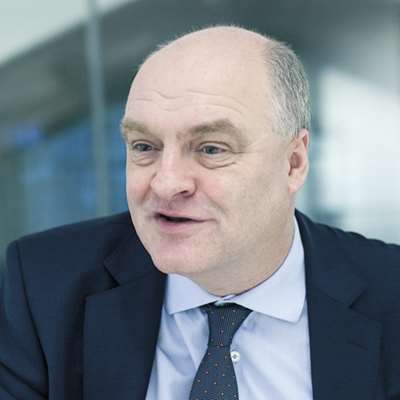Last night, members of the QuotedData team attended the annual Investment Company of the Year Awards in London, hosted by leading investment trade title Investment Week and sponsored by the Association of Investment Companies.
This year, the Jackie Beard Award for Outstanding Contribution to the Industry was awarded to two individuals that have been in the industry for a combined 60+ years. The first recipient was Ian Sayers, former chief executive of the Association of Investment Companies. Sayers steered the industry through some difficult times and, while technical director, shepherded in the rule change that allowed trusts to buy back shares, which has proved transformative for discounts and governance standards.
The second recipient was Baillie Gifford’s James Anderson (pictured), manager of the £21.5bn Scottish Mortgage Investment Trust (SMT). Anderson was commended for his leadership and forward-thinking on what is one of the most popular and successful trusts in UK investment history, and thanked for his contribution towards the industry as he approaches his retirement at the end of April 2022.
For investors, the exit of what is considered to be a ‘star’ manager can be a worrying event, especially for a trust that has been so profitable under that manager’s tenure. Over the past 20 years (Anderson was appointed in April 2000), SMT has delivered a staggering 2893%.
On 19 March 2021, the day of the announcement of the manager’s retirement, the trust’s share price fell by 3%. When news like this hits, knee-jerk reactions are inevitable and it is likely some investors may have panic sold despite the fact that Anderson’s co-manager of six years, Tom Slater, who shares the same forward-thinking attitude, will take over as lead. The trust sprung back up the very next day and has since returned 31%.
This was probably a situation where damage was limited. Baillie Gifford is well-known for its team-based approach and succession planning has always been key within its management teams, which when well executed, can lead to a seamless handover with very little change in approach.
This addresses the potential issues associated with key-man risk – that is if a ‘star’ manager who has enjoyed time in the limelight leaves, the risk is the fund will suffer. The market response to Anderson’s announcement barely made a dent in SMT’s performance likely due to the absence of key-man risk but that hasn’t always been the case for other investment trusts.
Meanwhile, not all manager exits are a result of a long-planned retirement or have the luxury of being announced a year before the departure actually takes place.
In 2019, the board of the then £44m Jupiter UK Growth (JUKG), which had been managed by Steve Davies since 2016, admitted its strategy was ‘not working and [needed] to be changed’. It was unclear whether this would mean a change in manager, but sure enough, the trust fell by almost 7% over the following few days, behind the FTSE All Share and its UK All Companies sector average, both of which were up 15% over the same period. JUKG’s market cap slowly depleted and the board eventually decided to wind the company up.
A change in manager may also mean a change in company rather than a change in individual.
More recently, in July this year, the board of then-named Genesis Emerging Markets completed an extensive review of its management arrangements and revealed plans to hire Fidelity International as its new manager and to rename the trust as Fidelity Emerging Markets (FEML).
Interestingly, the trust’s share price rose by 3% in the days that followed but then tumbled by as much as 11% by the end of October as 85% of the investment trust’s shareholders voted to cash in their shares. Since then the trust has performed positively but still has some way to go to prove the benefits of its new mandate and new managers.
Optimist that I am, I’d like to think Fidelity’s strong global brand, investment trust base and already solid expertise in some of EM regions will eventually come through. The fee reduction and ongoing discount control mechanisms will also be very welcome for shareholders.
The huge take-up for the tender offer may well have been a knee-jerk reaction, encouraged by the current market environment which remains on guard almost two years into a Covid world, and as emerging markets haven’t been delivering the stellar results they have been used to over the past two decades.
At the risk of sounding like a cliché, the best thing to do is to keep calm and carry on. While very high-profile manager changes can hit the news headlines, many changes will occur without fanfare. Keep on top of your investments and look out for announcements of change before making an informed decision on what to do – if anything.
